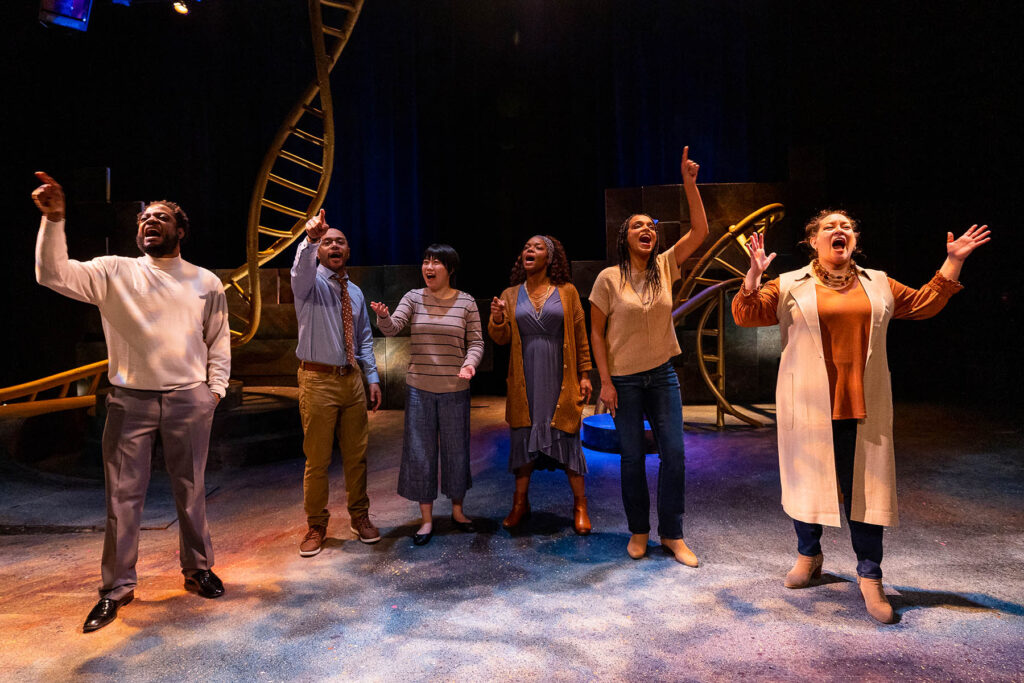
‘Young Nerds of Color’ – Arranged by Melinda Lopez; Directed by Dawn M. Simmons; Original Music Composed by Nona Hendryx; Set Design by Shelley Barish; Costume Design by Rachel Padula-Shufelt; Lighting Design by Andrea Sofia Sala; Presented by the Underground Railway Theatre at Central Square Theater, 450 Massachusetts Avenue, Cambridge through March 20.
by Mike Hoban
As a young boy growing up in the sixties, my only exposure to scientists was through Saturday afternoon science fiction movies on “Creature Double Feature”, which showed mostly cheesy black-and-white films like The Deadly Mantis and It Came From Outer Space. The scientists were – nearly without exception – older white men, except when the offering was Destroy All Monsters or some other campy romp from Japan. As I grew older and my tastes matured somewhat, depictions of scientists on film and TV were still mostly old white guys, although white women scientists began to appear occasionally onscreen. What audiences didn’t see were scientists that were people of color.
And while I was unlikely to envision myself as a scientist (kids who grow up eating the government cheese are far less likely to have those aspirations), the scientists on screen looked like me, so at least I could have imagined myself as a scientist. Not so much for Black and brown kids, a point made abundantly clear in Underground Railway Theatre’s Young Nerds of Color, which makes a strong case for why representation does matter, and not just in theater. Produced in collaboration with the Brit dʼArbeloff Catalyst Collaborative at MIT, and drawing on interviews with 60 “nerds of color”, the piece focuses on the experiences of nine individuals in various scientific fields, who shine a light on the inequity while offering the key ingredients to change: recognition of the problem and representation.

We meet the scientists (none of whom are named Neil deGrasse Tyson, the rock star astrophysicist and TV personality), who share their stories of exclusion and the lack of mentorship provided to their white counterparts as they went through their schooling and careers. The show opens with Dr. Sylvester James “Jim” Gates, Jr., (portrayed wonderfully by James Ricardo Milord) the theoretical physicist known for his work on supersymmetry, supergravity, and superstring theory, playing what looks like a cross between a stand-up bass and Excalibur waiting to be pulled from a glowing stone. When asked what he would tell young nerds of color, Gates responds “A score to an intricate piece of music is at least as complicated as pages of mathematical calculations.” His meaning becomes clearer later on in the piece when Dr. DJ Thomas (also played by Milord) explains that although science and math appear to be nonmalleable, “the inflections you give to it, the intonations that you give to the notes that’s you, that’s your expression.”

The nine “nerds” alternate relating portions of their stories, often in fragments, that give the audience a clearer picture of what obstacles they faced in pursuit of their STEM (Science, Technology, Engineering, and Math) careers. There’s Anne Harper-Jones (Central Square regular Kortney Adams), who relates how she missed out on opportunities due to a lack of guidance and parental misunderstanding, as she passed up a valuable lab internship because her parents insisted she work at a summertime job at Six Flags. But she later goes on to talk about her pivotal role in finding a flaw in scientific sampling, i.e. that marginalized (and/or lower income) communities are often not included in population studies and fail to create truly representative models for research. Another scientist, Dr. Portia Long (Lindsey McWhorter), conveys the frustration felt by many people of color in professional settings, “You feel like you have to be 50 times better than everyone else…”

The cast is likable, enthusiastic, talented and earnest, but the structure and the material sometimes lets them down. And considering the wealth of material playwright Lopez has to mine, some of the stories, quite frankly, are just not that interesting and do little to advance the narrative. While Nerds is educational and enlightening, it feels more like a school presentation than actual theater, and one could easily see this as a valuable tool in middle or high school systems, particularly in communities with diverse populations. I came away learning more about the lack of diversity in the STEM fields, but I would have liked to have seen more compelling human stories illustrating the issues. For more information and tickets, go to: https://www.centralsquaretheater.org/shows/young-nerds-of-color/

